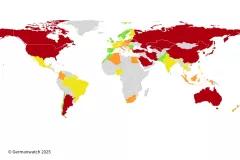The European Commission has made a proposal that specifies its “intended nationally determined contribution” (INDC) to the new international agreement on climate change. The proposal is to reduce domestic greenhouse gas emissions by at least 40% below 1990 in 2030. However, it now also includes forestry accounting, which could effectively weaken the reductions necessary by all others sectors by a few percentage points.
The original proposal of domestic reductions of 40% is already less ambitious than the range of what studies find to be the EU’s fair contribution to the global effort to limit warming to 2°C. The EU aims to submit its final proposal to the UN by end of March 2015. The formulation in the final agreement on its INDC will determine whether the inclusion of forestry will weaken the EU’s action on climate change.
The EU now has a chance to set a good example of transparency and environmental integrity by improving its own INDC. Read More.
The Climate Action Tracker assesses government pledges and actions against those needed to limit warming below a 2°C increase above pre-industrial levels, and against the goal of bringing warming below 1.5°C by 2100.







